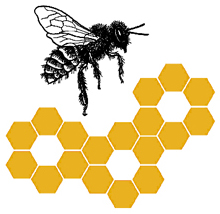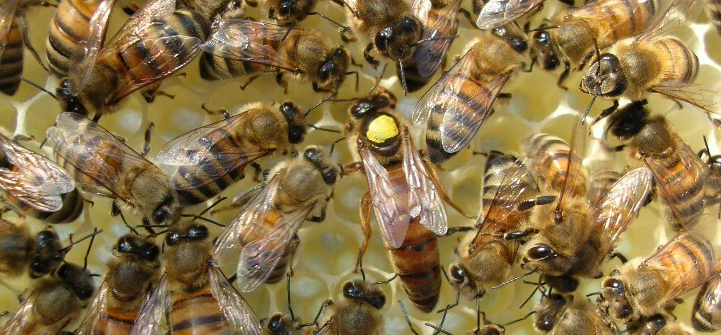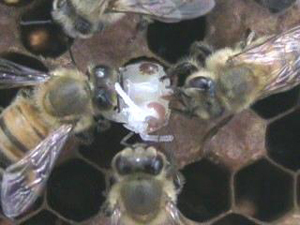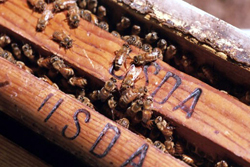The USDA-ARS Baton Rouge Bee Lab has bred bees that hygienically remove mite-infested pupae from capped worker brood. This ability is called varroa sensitive hygiene, and bees expressing high levels of this behavior are called VSH bees. To select for the VSH trait in your bees, also see Selecting for Varroa Sensitive Hygiene
…Proceedings of the American Bee Research Conference 2010
- Published in the American Bee Journal, June 2010
Download a .pdf of the 2010 ABRC proceedings.
The 2010 American Bee Research Conference was held January 14-15 at the Wyndham Orlando Resort in Orlando, Florida. This was a special joint conference between the American Association of Professional Apiculturists and the Canadian Association of Professional Apiculturists. The twenty fourth American Bee Research Conference will be held in conjunction with a joint meeting of the American Beekeeping Federation and the American Honey Producers …
Breeding Bees for Resistance to Parasites and Diseases

A National Research and Extension Initiative to Reverse Pollinator Decline
This is part of an ongoing series of updates from the Managed Pollinator CAP. Additional installments can be found at the:
More information about the CAP can be found at:
CAP Updates: 9
Greg Hunt, Purdue University
- Jointly published in the American Bee Journal and in Bee Culture, July 2010.
Those of you who have been …
Detect Nosema Parasite in Time to Save Bee Colonies

A National Research and Extension Initiative to Reverse Pollinator Decline
This is part of an ongoing series of updates from the Managed Pollinator CAP. Additional installments can be found at the:
More information about the CAP can be found at:
CAP Updates: 3
Katherine Aronstein, Research Molecular Biologist, USDA/ARS
- Jointly published in the American Bee Journal and in Bee Culture,
Shook Swarm and OTC Antibiotics for European Foulbrood Control
Research Summary
Citation:
Waite, R. J., Brown, M. A., Thompson, H. M., Bew, M. H. (2003). Controlling European foulbrood with the shook swarm method and oxytetracycline in the UK. Apidologie 34: 569-575.
Web Link:Controlling European foulbrood with the shook swarm method and oxytetracycline in the UK.
Brief Description:
In the United Kingdom, where this study occurred, European foulbrood (EFB) is a regulated disease. Typically, infected colonies can be treated with the antibiotic oxytetracycline (OTC), if the colony is determined …
When Varroacides Interact

A National Research and Extension Initiative to Reverse Pollinator Decline
This is part of an ongoing series of updates from the Managed Pollinator CAP. Additional installments can be found at the:
More information about the CAP can be found at:
CAP Updates: 2
Reed M. Johnson, University of Nebraska-Lincoln:
- Jointly published in the American Bee Journal and in Bee Culture, December 2009
Colony Collapse Disorder Progress Report 2009

Mandated by the 2008 Farm Bill [Section 7204 (h) (4)], this first annual report on Honey Bee Colony Collapse Disorder (CCD) represents the work of a large number of scientists from 8 Federal agencies, 2 state departments of agriculture, 22 universities, and several private research efforts.
In response to the unexplained losses of U.S. honey bee colonies now known as colony collapse disorder (CCD), USDA’s Agricultural Research Service …
USDA-ARS Bee Labs
The USDA-ARS sponsors five bee research labs at
- Baton Rouge, Louisiana
- Beltsville, Maryland
- Logan, Utah
- Tucson, Arizona.
- Weslaco, Texas
Honey Bee Breeding, Genetics and Physiology Research Unit
Baton Rouge, Louisiana bee lab
Mission:
The mission of the Honey Bee Breeding, Genetics and Physiology Research Unit is directly related to improving honey bee stock and honey bee management. This broad mission includes components related to problems caused by varroa mites, tracheal mites and Africanized honey bees. The devastating problems caused by …




